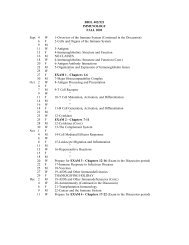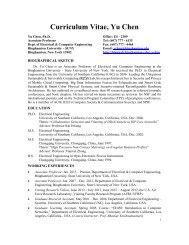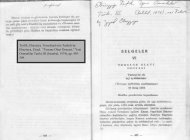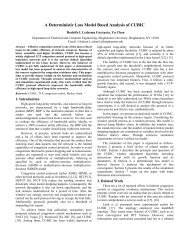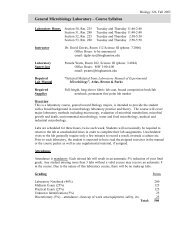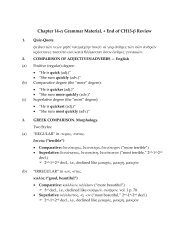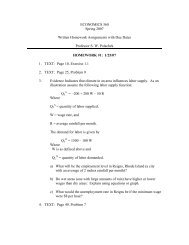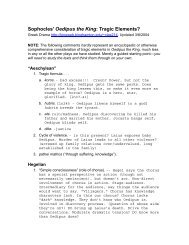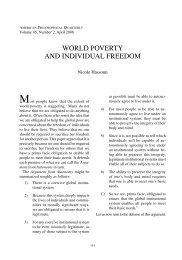Aristotle Poetics - Harvey.binghamton.edu
Aristotle Poetics - Harvey.binghamton.edu
Aristotle Poetics - Harvey.binghamton.edu
Create successful ePaper yourself
Turn your PDF publications into a flip-book with our unique Google optimized e-Paper software.
<strong>Aristotle</strong> <strong>Poetics</strong> 8<br />
tion resulting from what has been said. A tragedy, then, is the imitation of an action that<br />
is serious and also, as having magnitude, complete in itself; in language with pleasurable<br />
accessories, each kind brought in separately in the parts of the work; in a dramatic, not<br />
in a narrative form; with incidents arousing pity and fear, wherewith to accomplish its<br />
catharsis of such emotions. 43 Here by “language with pleasurable accessories” I mean<br />
that with rhythm and melody or song superadded; and by “the kinds separately” I mean<br />
that some portions are worked out with verse only, and others in turn with song.<br />
10<br />
20<br />
As they act the stories, it follows that in the first place the spectacle 44 must be some part<br />
of the whole; and in the second melody and diction, these two being the means of their<br />
imitation. Here by “diction” I mean merely this, the metrical arrangement of the words;<br />
and by “melody,” what is too completely understood to require explanation. But further:<br />
the subject represented also is an action; and the action involves agents, who must necessarily<br />
have their distinctive qualities both of temperament (ethos) and thought (dianoia),<br />
since it is from these that we ascribe certain qualities to their actions. There are in the<br />
natural order of things, therefore, two causes, temperament and thought, of their actions,<br />
and consequently of their success or failure in their lives. Now the action (that which was<br />
done) is represented in the play by the plot (muthos). The plot, in our present sense of the<br />
term, is simply this, the combination of the incidents, or things done in the story; whereas<br />
temperament is what makes us ascribe certain moral qualities to the agents; and thought<br />
is shown in all they say when proving a particular point or, it may be, enunciating a general<br />
truth. There are six parts consequently of every tragedy, as a whole, that is, of such or<br />
such quality, namely, a plot, temperaments, diction, thought, spectacle (opsis), and melody;<br />
two of them arising from the means, one from the manner, and three from the objects<br />
of the dramatic imitation; and there is nothing else besides these six. Of these, its<br />
formative elements, then, not a few of the dramatists have made due use, as every play,<br />
one may say, admits of spectacle, temperament, plot, diction, melody, and thought.<br />
The most important of the six is the combination of the actions of the story. 45<br />
30<br />
Tragedy is essentially an imitation not of persons but of action and life, of happiness and<br />
misery. All human happiness or misery takes the form of action; the end for which we<br />
live is a certain kind of activity, not a quality. Temperament gives us our personal qualities,<br />
but it is in our actions—what we do—that we are happy or the reverse. In a play accordingly<br />
they do not act in order to portray temperament; they include temperament for<br />
the sake of the action. So that it is the action in it, that is, its plot, that is the end and purpose<br />
of the tragedy; and the purpose is everywhere the chief thing. Besides this, a tragedy<br />
is impossible without action, but tragedy does not have to represent the inner qualities of<br />
43 The term “catharsis” (katharsis) literally means “cleansing” or “purifying.” That<br />
should mean that watching tragedy “purges” the spectator’s system of emotional impurity—drama<br />
as therapy. Note that pity (eleos), like fear (phobos), could be regarded as an<br />
undesireable disturbance to the psyche. In <strong>Aristotle</strong>’s Politics (8.7 1341b32–1342a16),<br />
the philosopher remarks on ecstatic music that has the effect of cleansing (katharsis) the<br />
soul of emotions like pity, fear, and “a possessed state” (enthousiasmos).<br />
44 “Spectacle” = ho tes opseos kosmos, “the beauty of the visual impression.”<br />
45 <strong>Aristotle</strong> regards plot (muthos) as the most important element in tragedy.



